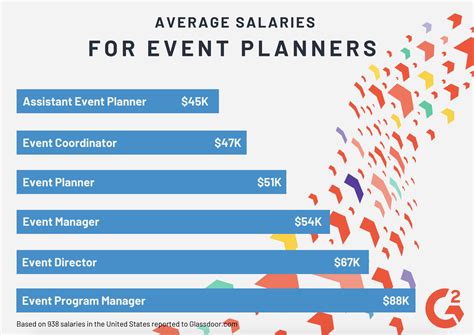Are you passionate about organizing events and making people’s special moments memorable? Have you ever considered turning that passion into a lucrative career? In this blog post, we will explore the world of event planning and the potential for earning a good living in this exciting industry. From the essential skills and qualifications required, to the various types of events and their planning processes, we will delve into the intricacies of this profession. We will also uncover the average salary range for event planners, the factors that can affect their earnings, and valuable tips on how to negotiate higher salaries. Additionally, we will discuss the benefits and perks of being an event planner, the importance of networking, earning additional income, and the promising career growth opportunities in this field. Whether you are an aspiring event planner or simply curious about the industry, this post will provide you with valuable insights into the world of event planning and the financial rewards it can offer.
Table of Contents
What is Event Planning?
Event planning is the process of coordinating and organizing a wide range of activities and logistical details for occasions such as weddings, corporate events, conferences, and parties. It involves everything from choosing a venue, to arranging for catering, entertainment, and transportation, to managing the budget and timeline. The goal of event planning is to create a memorable and seamless experience for guests while ensuring that everything runs smoothly behind the scenes.
Event planners are responsible for turning their clients’ visions into reality, while also managing the practical aspects of the event to ensure that it meets all necessary requirements. This can involve working closely with vendors, overseeing set-up and tear-down, and troubleshooting any issues that arise. It’s a high-stakes, fast-paced role that demands strong organizational skills, attention to detail, and the ability to think on one’s feet.
As an event planner, you not only have to be able to juggle multiple tasks simultaneously, but also anticipate potential challenges and come up with creative solutions in real-time. The job requires a combination of logistical expertise, people skills, and creative flair. Success in event planning is often measured by the ability to execute a flawless event that leaves a lasting impression on attendees.
In conclusion, event planning is a multifaceted profession that involves a diverse set of tasks and responsibilities. It requires a unique blend of creativity, strategic thinking, and strong interpersonal skills. Whether you’re coordinating a small, intimate gathering or a large-scale event, the role of an event planner is to bring people together and create memorable experiences that leave a lasting impact.
Skills and Qualifications Needed
Event planning is a dynamic and demanding field that requires a diverse set of skills and qualifications. A successful event planner must have excellent organizational and time management abilities, as well as exceptional communication and interpersonal skills. These professionals should be detail-oriented and have the ability to multitask effectively, as they often need to coordinate numerous aspects of an event simultaneously.
In addition to these soft skills, event planners should also possess a solid understanding of event management principles, including budgeting, venue selection, marketing, and logistics. A background in hospitality, marketing, or business can provide a strong foundation for a career in event planning, and relevant qualifications such as a degree in event management or certification from a professional organization can help individuals stand out in this competitive industry.
Furthermore, staying updated with the latest industry trends, technologies, and best practices is crucial for event planners to remain competitive and successful in their careers. Continuous learning and professional development, such as attending workshops, conferences, and networking events, can further enhance an event planner’s skills and qualifications.
Overall, a successful event planner should have a combination of soft skills, industry knowledge, and relevant qualifications to thrive in this challenging yet rewarding profession.
Types of Events and their Planning Process
When it comes to event planning, there are various types of events that require meticulous planning and execution. One of the most common types of events is corporate events, such as conferences, trade shows, and seminars. These events often involve organizing guest speakers, coordinating exhibition spaces, and managing event logistics.
On the other hand, social events like weddings, birthdays, and other celebrations require a different approach. Event planners in this space need to be skilled in coordinating with vendors, managing budgets, and creating a memorable experience for the guests.
In addition to corporate and social events, there are also non-profit events, such as charity fundraisers, galas, and awareness campaigns. These events require a unique set of skills, including fundraising and donor management, as well as a strong understanding of the organization’s mission and goals.
Regardless of the type of event, the planning process typically involves identifying the client’s needs and objectives, creating a budget and timeline, scouting and securing event venues, coordinating vendors and suppliers, and managing event logistics on the day of the event. Successful event planning often requires attention to detail, strong communication skills, and the ability to think creatively and problem-solve under pressure.
Average Salary Range for Event Planners
Event planning is a dynamic and exciting career path that offers a wide range of opportunities for individuals who are passionate about creating memorable experiences. One of the important aspects to consider when pursuing a career in event planning is the potential salary range. With the demand for event planners on the rise, it’s essential to understand the average salary range for professionals in this field.
Event planners can expect to earn an average salary range of $45,000 to $70,000 per year, depending on factors such as experience, location, and the specific industry they work in. Entry-level event planners may start at the lower end of the range, while seasoned professionals with a strong track record of successful events may command higher salaries.
It’s important to note that event planning is a competitive industry, and professionals may need to demonstrate their skills and qualifications to secure higher-paying opportunities. Additionally, event planners who specialize in niche markets or work for reputable companies may have the potential to earn above the average salary range.
Ultimately, the average salary range for event planners reflects the value of their expertise in orchestrating successful events and creating unforgettable experiences for clients and attendees. As the demand for well-executed events continues to grow, the potential for higher salaries in the field of event planning is also on the rise.
Factors Affecting Event Planner Salaries
Event planning is a lucrative career option for individuals who possess the right mix of skills and qualifications. However, the salary range for event planners can vary significantly based on several factors.
One of the key factors influencing event planner salaries is the level of experience. Entry-level event planners can expect to earn a lower salary compared to those with several years of experience in the industry. Additionally, the reputation and track record of the event planner can also impact their earning potential.
Another important factor affecting event planner salaries is the geographic location. Event planners working in major metropolitan areas or in regions with a high demand for their services may command higher salaries compared to those working in less populous areas.
Furthermore, the size and scope of the events being planned can also impact an event planner’s earning potential. Planning large-scale events such as corporate conferences or international summits often comes with higher compensation compared to organizing small, local events.
How to Negotiate Higher Salaries
When it comes to negotiating higher salaries as an event planner, it’s important to be well-prepared and confident in your abilities. One of the first steps in negotiating a higher salary is to research the average salary range for event planners in your area. This will give you a better understanding of what you should be aiming for and will also provide you with valuable data to back up your negotiation.
Another important factor in negotiating higher salaries is to highlight your skills and qualifications. Emphasize your experience in event planning, any additional certifications or training you may have, and any specific achievements or successes you have had in your career. This will demonstrate to your employer that you are a valuable asset to the company and deserve to be compensated accordingly.
It’s also crucial to be confident in your negotiation skills and to clearly communicate your worth to your employer. Practice your negotiation tactics, be assertive in your requests, and be prepared to answer any questions or objections that may arise during the negotiation process. Remember that negotiating higher salaries is a normal part of the business world, and your employer will respect your confidence and professionalism.
Finally, be open to compromise and be prepared to discuss other forms of compensation, such as additional vacation days, flexible work hours, or performance-based bonuses. By being open to alternative forms of compensation, you can show your employer that you are flexible and willing to work towards a mutually beneficial solution.
Benefits and Perks of Being an Event Planner
Being an event planner comes with a myriad of benefits and perks that make it an attractive career choice for many individuals. One of the key benefits of being an event planner is the opportunity to work in a dynamic and fast-paced environment. Event planners often find themselves organizing a wide variety of events, ranging from corporate conferences to social gatherings, which allows for a diverse and exciting work experience.
Another perk of being an event planner is the chance to exercise creativity and innovation in event design and execution. Event planners are often tasked with coming up with unique and engaging event concepts, which allows for self-expression and the cultivation of a personal brand within the industry.
Flexibility is also a key benefit of being an event planner. Many event planners have the ability to work from home or remotely, and often have flexible work hours to accommodate the demands of event planning, such as conducting site visits, meeting with clients, and attending events.
Additionally, being an event planner can provide a sense of job satisfaction that comes from seeing an event come together successfully and receiving positive feedback from clients and attendees. This can be a major source of fulfillment and motivation for those in the industry.
The Importance of Networking in the Industry
Networking is a crucial aspect of almost every industry, and event planning is no exception. Building and maintaining a strong network can be extremely beneficial for event planners in various ways.
Firstly, networking allows professionals to connect with potential clients, vendors, and other industry professionals. By attending industry events, conferences, and workshops, event planners can meet new contacts and cultivate relationships that may lead to business opportunities in the future.
Secondly, networking provides the opportunity to learn from others in the industry. By engaging with peers and mentors, event planners can gain valuable insights, knowledge, and best practices that can help them improve their skills and stay updated on industry trends.
Lastly, a strong network can provide support and encouragement. The event planning industry can be demanding and challenging, so having a network of like-minded professionals can offer emotional support, motivation, and collaboration opportunities.
Earning Additional Income as an Event Planner
Event planning is a demanding yet rewarding career that offers a variety of opportunities for additional income. Whether you are just starting out or have been in the industry for some time, there are several ways to increase your earnings as an event planner.
Freelancing is a great way to earn additional income as an event planner. Many event planners choose to take on freelance projects in addition to their full-time job. This can be anything from organizing small private events to consulting for other event planning companies. It allows you to use your skills and knowledge to generate extra income.
If you have a passion for teaching or mentoring, you can offer workshops or training sessions for aspiring event planners. Sharing your expertise with others not only provides an additional source of income but also helps to establish you as an authority in the field.
Another way to earn extra income is by offering additional services such as event design, catering, or equipment rental. By expanding your range of services, you can cater to a wider range of clients and increase your earning potential.
Career Growth Opportunities for Event Planners
Event planning is a dynamic and exciting career that offers a wide range of growth opportunities for professionals in the industry. As an event planner, there are several paths you can take to advance your career and take it to the next level. Whether you’re just starting out in the field or looking to expand your horizons, there are numerous opportunities for career growth and development.
One of the most common ways to grow as an event planner is to specialize in a particular type of event. By focusing on a specific niche, such as corporate events, weddings, or music festivals, you can become an expert in that area and position yourself as a go-to planner for those types of events. This specialization can lead to higher-profile clients, larger budgets, and more prestigious events, all of which can help to propel your career forward.
Another way to boost your career prospects is to pursue additional certifications or credentials in event planning. By obtaining specialized training or certifications, such as Certified Meeting Professional (CMP) or Certified Special Events Professional (CSEP), you can demonstrate your expertise and commitment to the field, which can open doors to new opportunities and higher-paying positions.
Networking is also crucial for career growth in event planning. Building and maintaining strong relationships with clients, vendors, and colleagues in the industry can lead to new job opportunities, referrals, and valuable insights that can help you to advance in your career. By attending industry events, joining professional organizations, and staying active on professional networking platforms, you can expand your professional network and create new opportunities for career growth.






